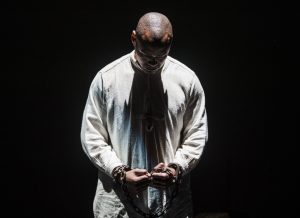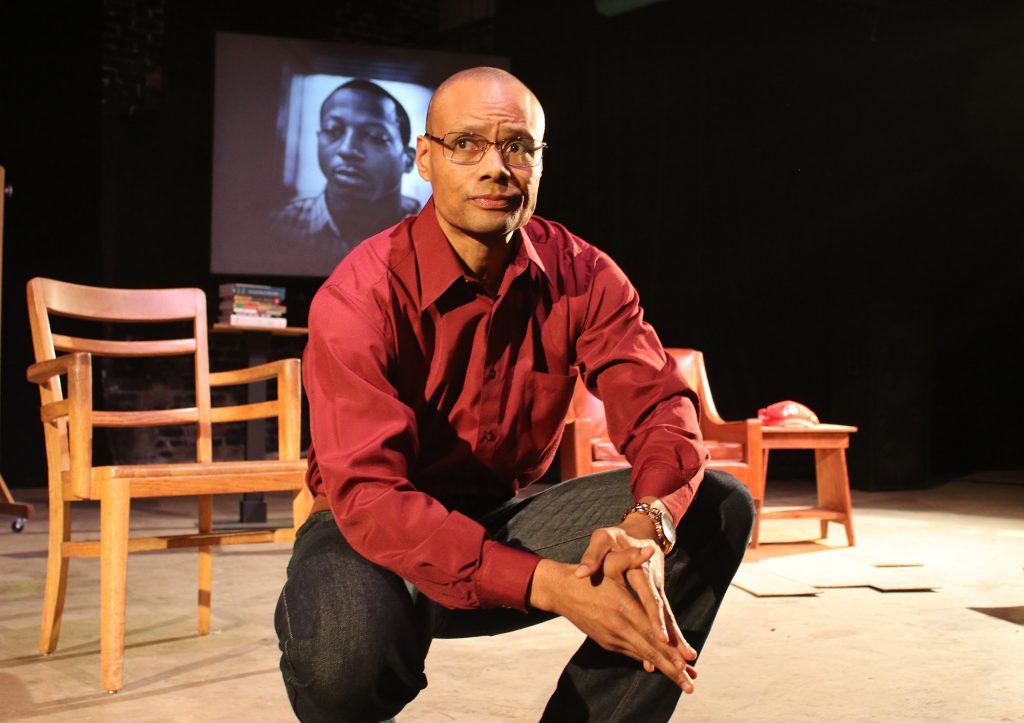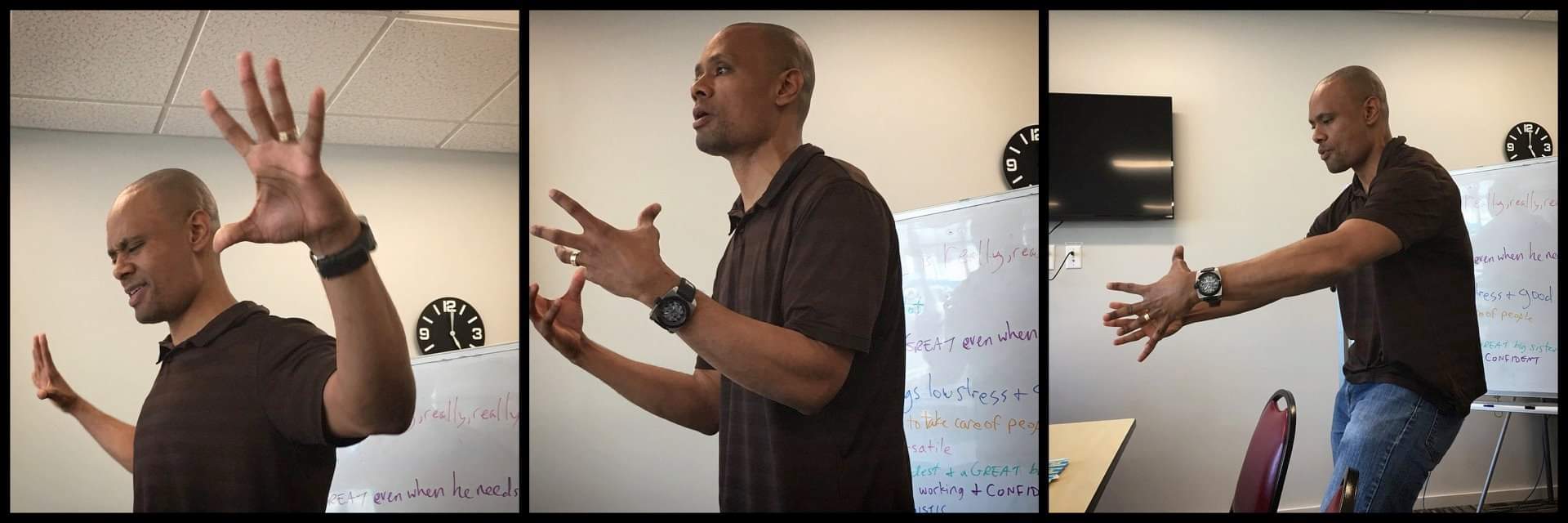Art is power. That’s a core belief underlying Sonny Kelly‘s work as a performer, teacher, mentor and scholar. Kelly, who received the Carolina Center for Public Service Community Engagement Fellowship in 2017, lives out that belief through his work in Chapel Hill, in his community in Fayetteville, NC and beyond.
“I’m using performance to do two things,” Kelly said. “First, community engagement that can pull underrepresented youth together and empower them to share their voices and speak out to the public in a way that not only humanizes them but reframes and reclaims their narratives and affirms their right to be a more dignified human being. The second thing we do is public engagement, bringing folks to the performance.”

The Community Engagement Fellowship program, which runs from March to November, is a financial award for Carolina graduate students working on projects that combine academics with community engagement. During the summer of his fellowship, Kelly led a youth-oriented performing arts program in Fayetteville called My Life Matters. Based at Fayetteville Urban Ministry (FUM), the program dovetails with Kelly’s doctoral research at Carolina, which focuses on youth at risk for incarceration.
For those less familiar with the concept of the “school to prison pipeline” that so frustrates and motivates Kelly, he would tell you that black students are three times more likely to live in poverty, four times more likely to be suspended and five times more likely to be incarcerated than their white peers.
“It’s a systemic flow,” Kelly said. “It’s multi-layered. It’s complicated. It’s a combination of individual choices and the system, but the preponderance of that burden is on black children in America.”
My Life Matters provided student participants with a creative outlet for reframing their personal narratives. Kelly designed the program to prepare and empower the students to act as advocates and activists on behalf of themselves and their communities.
Ultimately, he learned from the students while working to teach them.
“I’m always sharing with the kids, they’re sharing with me and we’re learning mutually,” Kelly said. “As I’m challenging them to write stories, I’m writing a play.”
That play is now known as The Talk: an 80-minute, one-person show Kelly said was spurred on from his interactions with the students at FUM. In The Talk, Kelly combines words and inspiration from African-American writers, news stories about police brutality and his own personal memories into a heart-wrenching exploration of what it means to be black and male in the United States.

The play centers on a single moment when Kelly confronts his duty to warn his young son, Sterling, about the dangers he will face because he is black. Kelly’s initial inspiration for the piece was a real conversation he had with Sterling, then seven, in 2015—when Sterling overheard news coverage of protests in Baltimore after a 25-year-old black man named Freddie Gray died of a spinal cord injury while in police custody.
“I didn’t know if (Sterling) would be ready for it, but you don’t have to be ready for it,” Kelly said. “I realized I should probably prepare him for the world.”
When Kelly performs The Talk, he usually follows it up with a workshop or audience discussion to facilitate dialogue around these difficult topics.
“I perform The Talk to diverse audiences,” he said. “Afterwards, some people are crying because they never knew, and some cry because of personal experience. When you lead with vulnerability, they see that as permission to engage. How do we have conversations with people who are different from us? Through poetry and workshops we can ‘call each other in,’ through conversation and a new collective sense of healing.”
Kelly has a master’s in communication but needs a Ph.D. to achieve his goal of joining a university at the faculty level. He expects to defend his dissertation and graduate from Carolina in May 2020.
“When people think about artistic expression, they think it’s not rigorous, not scholarship, not politically effective,” he said. “But poetic inquiry can be an effective way of expressing what you’ve learned, using creative ways of expression to show things we’re experiencing that we don’t have words for. Treating social issues that impact those who are oppressed and marginalized as mere intellectual inquiry is a disservice, and it’s ineffective. Yes, know the statistics. Yes, know the psychology behind things. And yes, let’s move our bodies in a way that helps us understand what’s happening and how we can move toward solutions and imagine new possibilities.”

Kelly sees those solutions unfolding in real time through his work. At the year-end gathering of the My Life Matters program at FUM, 12 Fayetteville children performed for 50 audience members, including the mayor.
“All these kids had come from rough backgrounds, and to have the mayor sitting in the front row smiling and listening to you was a tremendous step forward.”
Later, the city council invited three of the girls to share their poem at a council meeting.
“Performance is a powerful way of moving in the world and changing the world,” Kelly said. “And those tough conversations are necessary.”
Want to hear more from Kelly? Listen to Sonny Kelly on WUNC’s The State of Things in September 2019
For more information about Kelly’s work, visit his website.
The Community Engagement Fellowship program awards a maximum of eight fellowships of up to $2,000 each year for engagement or engaged scholarship projects that are responsive to community priorities and have an academic connection. Returning, full-time graduate students at UNC-Chapel Hill are eligible to apply. Fellows work in collaboration with community partners and faculty mentors who are familiar with their topics or geographic areas, while fellows are responsible for the major planning and implementation of their projects. The fellowships run from March through November.
Sonny Kelly would like to express particular gratitude to the following individuals:
Elenah Kelly, Sonny’s life partner and biggest fan
Johnny Wilson, Fayetteville Urban Ministry
Shauna Hopkins, Fayetteville Urban Ministry
Kathy Wood, UNC Graduate School Diversity and Student Success
Maria Dykema Erb, UNC Graduate School Diversity and Student Success
Patricia Parker, UNC Department of Communication
Renee Alexander Craft, UNC Department of Communication
Joseph Megel, UNC Department of Communication
Mitchell G. Capel, performer and mentor
